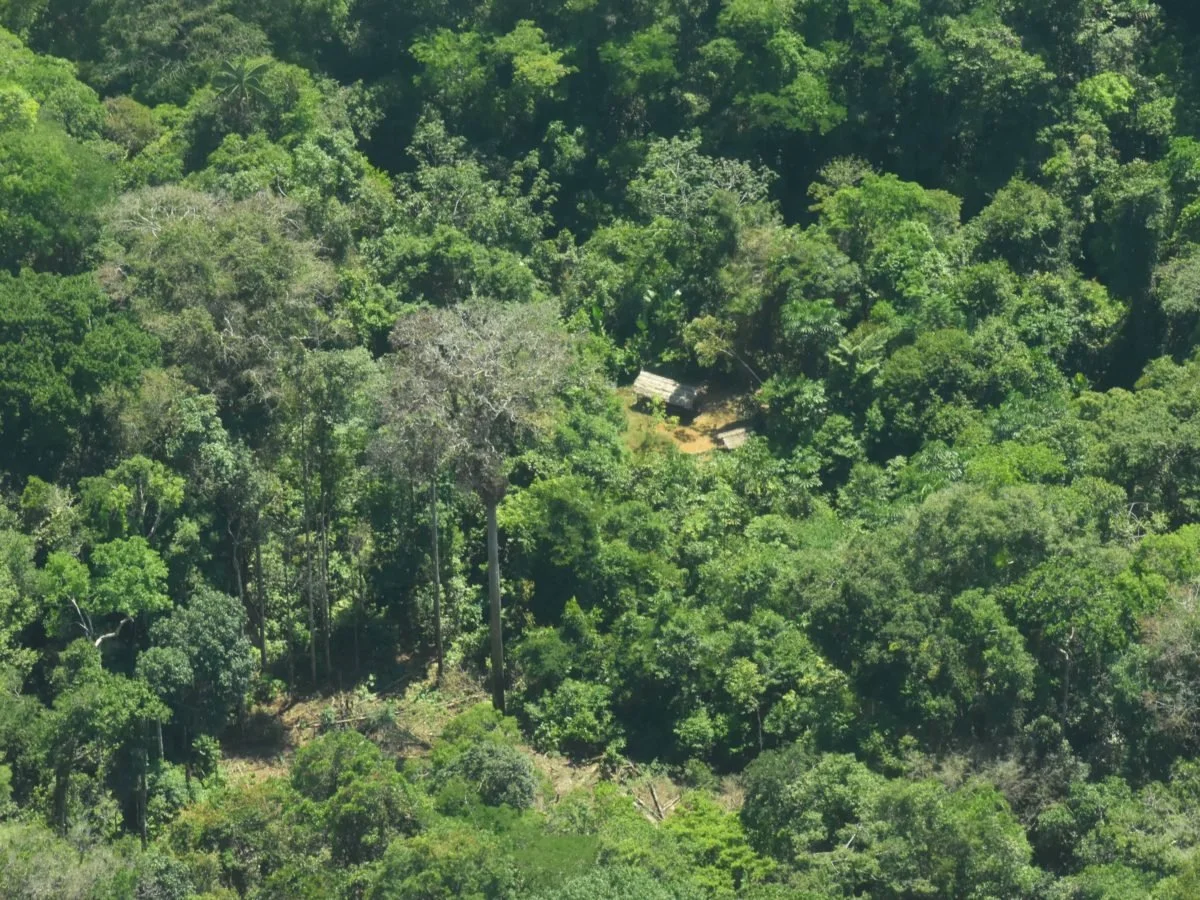Samtidigt som kriget i Ukraina och de geopolitiska spänningarna fortsätter, stiger energipriserna, vilket orsakar inflation världen över. Under tiden som detta pågår gör oljebolagen rekordvinster. FN:s generalsekreterare António Guterres beskriver denna situation som ”omoralisk”.
Men att generera häpnadsväckande vinster på bekostnad av det allmänna välbefinnandet är inte den enda omoraliska aspekten som sker i detta globala ögonblick. I länder som Peru driver de höga oljepriserna fram en ny våg av lagliga initiativ som gynnar oljeindustrin, lagar som till synes är tagna från tidigare decennier.
Det anglo-franska oljebolaget Perenco försöker aktivt att förhindra inrättandet av ett reservat för urfolk som befinner sig i frivillig isolering, människor som är särskilt utsatta för våld och smittsamma sjukdomar när utomstående tar sig in på deras territorium.
Perencos ekonomiska intresse står på spel, eftersom det föreslagna reservatet överlappar deras oljekoncessioner. Perus nationella urfolksfederation, AIDESEP, utfärdade nyligen ett offentligt fördömande, översatt till engelska nedan.
Perencos nuvarande juridiska strategi är att stämma Perus kulturministerium och kräva ogiltighetsförklaring av rapporten som godkände inrättandet av Napo-Tigre-reservatet för isolerade urfolk, vilket ignorerar den stora mängden bevis att denna avlägsna region i Amazonas regnskog är hem för urfolken Aewa, Taushiro, Tagaeri, Taromenane och Zaparo. En kommission bestående av mer än ett dussin regeringsdepartement och myndigheter godkände rapporten som innehöll totalt 292 bevis. Av gruppen var det bara energiministeriet och provinsregeringen i Loreto som röstade emot.
AIDESEP lämnade in en begäran om ett godkännande av rapporten, vilket var något som krävdes för att inrätta Napo-Tigre-reservatet. Godkännandet var resultatet av en 19-årig kampanj av AIDESEP och dess anslutna organisationer. Godkännandet innebär att den peruanska regeringen äntligen har erkänt att det finns folk i frivillig isolering som bor i denna region av Amazonas. Följaktligen har regeringen nu en moralisk och juridisk skyldighet att upprätta ett reservat som garanterar urfolkens rättigheter till liv och till deras landområde.
Perenco kräver dock att domaren beordrar kulturministeriet att inkorporera oljebolaget i godkännandeprocessen för Napo-Tigre-reservatet, "på så sätt kan det utföra sin juridiska verksamhet innan en ny kvalifikation utfärdas angående begäran om skapandet av urfolksreservatet presenterat av AIDESEP." Företaget insisterar att domaren stoppar hela processen tills Perenco formellt ingår i den multiministeriella kommission som ansvarar för att upprätta reservatet.
Som svar uttalade Julio Cusurichi, Goldman-pristagare och medlem av AIDESEP:s nationella råd:
"Det är otroligt och totalt oacceptabelt att detta utländska företag har stämt den peruanska regeringen och ignorerar existensen av dessa grupper av människor […] Peru kan inte ta ett steg tillbaka, regeringen måste gå vidare med processen av att skapa Napo-Tigre-reservatet till förmån för urfolk i isolering, något som har upprättats av lag […] Vi kommer inte att tillåta detta företag att ignorera eller bryta mot regelverket för skyddet av dessa mycket utsatta folk.”
Perenco är tyvärr inte det enda oljebolaget med bakåtsträvande juridiska initiativ på gång. Samtidigt föreslog Perupetro –en offentlig enhet som ansvarar för att erbjuda peruanska oljeblock på den internationella marknaden – nyligen ett lagförslag inför den peruanska kongressen som skulle "godkänna undantaget från förhandskonsultation (med berörda urfolk) för att underteckna ett korttidskontrakt." Om det antas skulle detta lagförslag underlätta återupptagandet av oljeutvinning i Block 8, en oljekoncession som plågas av hundratals miljökatastrofer och som har varit olösta i decennier.
Dessa juridiska attacker mot skyddet för urfolk samt Perus lag om fri, och informerad förhandskonsultation är exempel på hur oljelobbyn håller den nuvarande rättsliga ramen – produkten av år av kamp från peruanska urfolksrörelser och civilsamhället – under konstant belägring. Oavsett om attackerna kommer från den privata eller offentliga sektorn kommer AIDESEP och dess anslutna organisationer att uttala sig för att försvara urfolkens kollektiva och territoriella rättigheter.
Vi måste stå vaksamt vid deras sida. Det globala kravet att stoppa oljeexpansionen – oavsett om det är i Amazonas eller någon annanstans – är en av de mest angelägna frågor som mänskligheten måste ta itu med innan det är för sent.
-Ricardo Pérez Bailón
AIDESEP’s uttalande på engelska:
PUBLIC DENUNCIATION
Danger of Genocide in the Peruvian Amazon!
WE REJECT PERENCO OIL COMPANY’S INTENTIONS TO DENY THE EXISTENCE OF INDIGENOUS PEOPLES LIVING IN ISOLATION, PUTTING THEIR RIGHTS TO LIFE, HEALTH, AND INTEGRITY AT RISK
August 8, 2022
The Interethnic Association for the Development of the Peruvian Rainforest (AIDESEP), which represents 9 regional organizations, 109 federations and more than 2,400 Indigenous communities, addresses the President of the Republic, the Congress of the Republic, the Presidency of the Council of Ministers (PCM), the Ministry of Culture, The Office of the Ombudsman, the Commission of Amazonian, Andean, Afro-Peruvian Peoples, Environment and Ecology of the Congress of the Republic (CPAAAE), the Regional Government of Loreto, the national and international human rights organizations, the U.N. Special Rapporteur on the rights of indigenous peoples, the U.N. High Commissioner for Human Rights, the Inter-American Commission on Human Rights (CIDH), the authorities of the Catholic Church and other churches in Peru, the member countries of the Joint Declaration of Intent (DCI), the national and international community, and the press media to declare the following:
After a long and sustained struggle for more than nineteen years, on July 25, the Multisectoral Commission of Law No. 28736, Law for the Protection of Indigenous Peoples in Isolation and Initial Contact (PIACI), evaluated and approved the Prior Recognition Study (EPR) concerning the requested Napo-Tigre Indigenous Reserve, located in the provinces of Maynas and Loreto (department of Loreto). This resounding decision was made with 13 votes in favor and only 2 against (corresponding to the Regional Government of Loreto and the Ministry of Energy and Mines, institutions that reportedly have shown strong economic interests in the territories of our brothers and sisters in isolation). It is noteworthy that all the other ministries and institutions that are members of the Multisectoral Commission voted in favor of the approval of the EPR, as well as the municipal governments of the provinces of Maynas and Loreto.
With the approval of the EPR, the Multisectoral Commission officially recognized the existence of the Indigenous Peoples in Isolation (PIA) of the Aewa, Taushiro, Tagaeri, Taromenane, and Zaparo peoples in the territory of the requested Napo-Tigre Indigenous Reserve. This decision was made based on the 292 official, reliable and scientifically rigorous evidences that irrefutably demonstrate their existence. These evidences are part of strictly confidential official studies, carried out in the field and cabinet, in accordance with the provisions of the law.
The Judiciary, based on a ruling issued in 2018 by the Fourth Constitutional Court of the Superior Court of Justice of Lima, orders the Ministry of Culture to immediately arrange for the Multisectoral Commission to submit the Prior Recognition Study (EPR) and to issue the respective Supreme Decrees that acknowledge the existence of Indigenous Peoples in Isolation and declare the Indigenous Territorial Reserve, among others, so that the Peruvian State complies with the creation of the Napo-Tigre Indigenous Reserve (File N.° 12798-2016).
There are more than 20 neighboring Indigenous communities that actively support the creation of the Napo Tigre Indigenous Reserve and the protection of the Indigenous Peoples in Isolation. This is also supported by their representative organizations, which also form part of AIDESEP and the Regional Organization of Indigenous Peoples of the East (ORPIO): The Kichwaruna Wangurina Organization of the Upper Napo (ORKIWAN), the Federation of Indigenous Communities of the Tigre River (FECONAT) and the Federation of Indigenous Communities of the Middle Napo, Curaray and Arabela (FECONAMNCUA).
We reject and express our deep concern for the actions of the oil company Perenco Peru Petroleum, which by means of a lawsuit filed against the Ministry of Culture, has petitioned the nullification of the Favorable Qualification given to the request for the creation of the Napo-Tigre Indigenous Reserve, and is also asking to be incorporated into the process that evaluates the creation of this reserve.
With this lawsuit, the oil company seeks to improperly block a procedure that protects a legitimate claim whose sole purpose is to guarantee the life, health, and integrity of the Indigenous Peoples in Isolation, one of the most vulnerable human groups on the planet. This lawsuit was filed and admitted in June by the Sixth Constitutional Court of the Superior Court of Justice of Lima.
In addition, the company’s request for its inclusion in the process of creating the Napo-Tigre Indigenous Reserve constitutes a clear and manifest conflict of interest, since Oil Blocks 39 and 67, operated by Perenco, overlap with the territory of the Indigenous Peoples in Isolation.
It is important to point out that the manifested opposition to the creation of the Napo-Tigre Indigenous Reserve by the three communities mentioned by Perenco (grouped in the Federation of Indigenous Communities of Alto Curaray and Arabela – FECONACA) can be explained by the direct benefits that these communities would obtain from the operation of the oil block.
We consider it very alarming and revealing that the Public Prosecutor’s Office has stated in a news article that both the former president of FECONACA and the president of one of the communities opposed to the Napo-Tigre Indigenous Reserve proposal are fugitives from justice because they are being investigated as suspected members of the criminal organization “Los Duros del Amazonas” (“The Amazon Toughs”) for the crimes of illegal trafficking of timber and illicit association for criminal purposes. If these charges are confirmed, it would reveal that the true interests of some of the members of this organization in gaining access to the territories of the Indigenous Peoples in Isolation of the requested Napo-Tigre Indigenous Reserve, putting their life, health, and integrity at serious risk.
Both AIDESEP and ORPIO have been promoting the protection of the fundamental rights of Indigenous Peoples in Isolation and in Initial Contact, as well as the creation of Indigenous Territorial Reserves that have been delayed for decades. This has been sought through all the appropriate legal mechanisms and appealing to all the national and international bodies responsible for guaranteeing the fundamental human rights of indigenous peoples, especially when dealing with groups of special vulnerability and defenselessness such as the PIACI.
We demand that the foreign company Perenco respects the fundamental rights of our brothers and sisters, the Indigenous Peoples in Isolation of the requested Napo-Tigre Indigenous Reserve, whose existence has been formally recognized by the Peruvian State. Likewise, we urge the State to ensure that the process of creating the Napo-Tigre Indigenous Reserve follows its proper course, in strict compliance with current regulations and respecting the international standards on the matter.
We exhort the oil company Perenco, as well as its investors and partners, to respect the national and international legal framework in favor of the Indigenous Peoples in Isolation, otherwise we will initiate all necessary legal actions (national and international) to guarantee the life, health, and integrity of our brothers and sisters the Indigenous Peoples in Isolation of the requested Napo-Tigre Indigenous Reserve.

